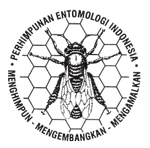Kemampuan Pemangsaan Menochilus sexmaculatus F. (Coleoptera: Coccinellidae) terhadap Rhopalosiphum maidis Fitch (Homoptera: Aphididae)
DOI:
https://doi.org/10.5994/jei.8.1.1Keywords:
functional response, predator prey interaction, biological controlAbstract
The objective of this research was to study the functional response of M. sexmaculatus. The hypothesis of this study was that age of predator and the numbers of prey will effect predation rate. To test this hypothesis, a set of prey (first and fourth instar and adult R. maidis) was separately placed together with first and fourth instar larval and adult female of M. sexmaculatus at different densities. The length of the exposure of the hosts were respectively 13, 14 and 2 hours for 1st instar larval predator, 4th instar larval predator and adult predators. In addition a combination of 1st and 4th instar nymph of R. maidis were exposed to adult M. sexmaculatus for 24 hours. The result of this study showed that the ability to predation of young and adult M. exmaculatus was type II, indicating that M. sexmaculatus can be categorized as effective biological control agent. Adults of M. sexmaculatus are better predators than the larval stages. Based on non linear regression analysis, the maximum numbers of preys consumed by adult females of M. sexmaculatus was 300 individuals of various stages of R. maidis per 24 hours.
Downloads
Downloads
Published
How to Cite
Issue
Section
License
Authors who publish with this journal agree to the following terms:
- Authors retain copyright and grant the journal right of first publication with the work simultaneously licensed under a Creative Commons Attribution 4.0 International License that allows others to share the work with an acknowledgement of the work's authorship and initial publication in this journal.
- Authors are able to enter into separate, additional contractual arrangements for the non-exclusive distribution of the journal's published version of the work (e.g., post it to an institutional repository or publish it in a book), with an acknowledgement of its initial publication in this journal.
- Authors are permitted and encouraged to post their work online (e.g., in institutional repositories or on their website) prior to and during the submission process, as it can lead to productive exchanges, as well as earlier and greater citation of published work (See The Effect of Open Access).








